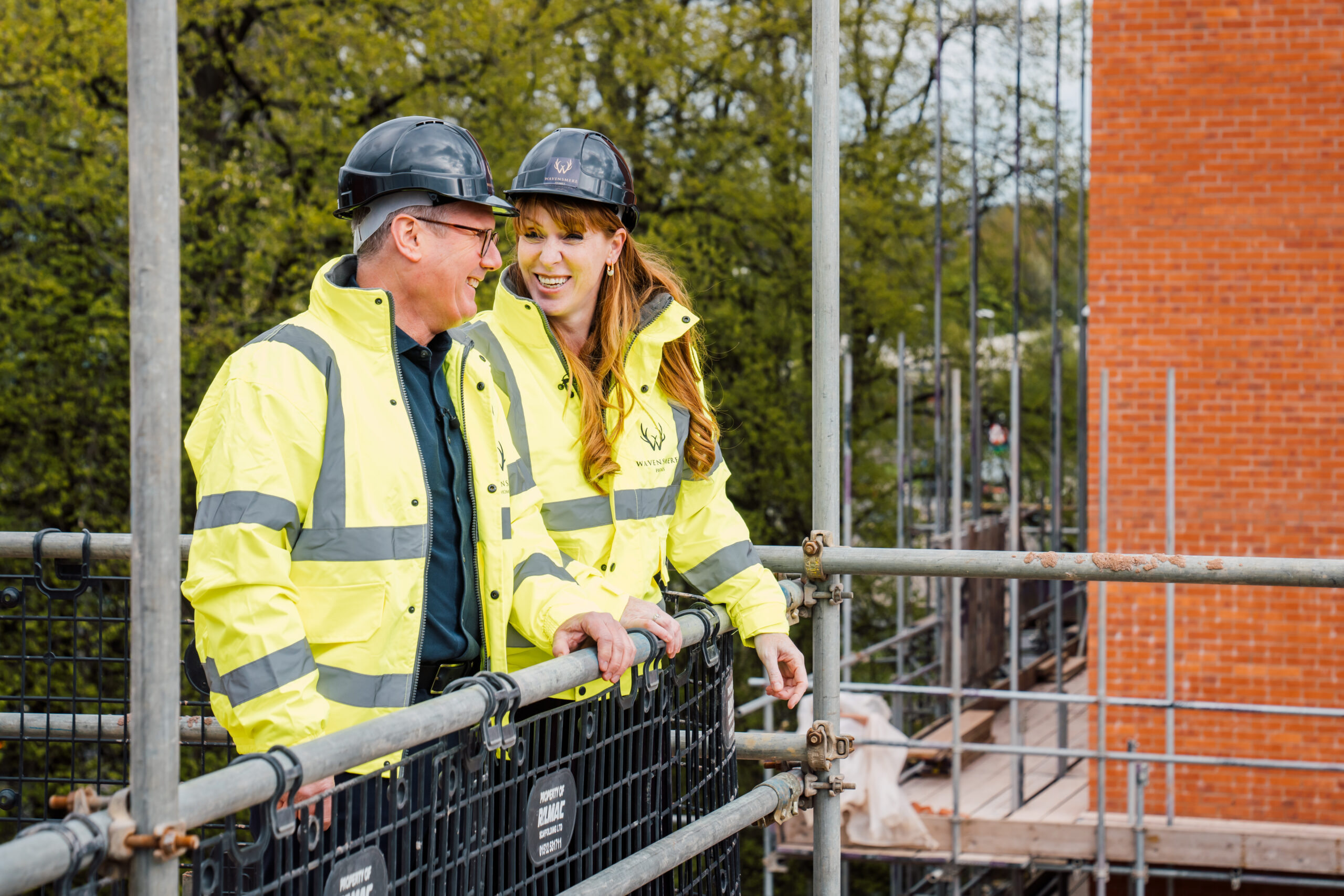Kickstart economic growth

How Labour will kickstart economic growth:
- Deliver economic stability with tough spending rules
- A new partnership with business and the Welsh Labour Government to boost growth everywhere
- A National Wealth Fund to invest in jobs
- Deliver 20,000 additional homes for social rent this Senedd term
- A New Deal for Working People
Skip to:
Sustained economic growth is the only route to improving the prosperity of our country and the living standards of working people. That is why it is Labour’s first mission for government. It means being pro-business and pro-worker. We are the party of wealth creation.
This election follows the chaos of the Conservatives’ ‘mini-budget’ and an unprecedented fall in living standards. Their miserable economic record over the past 14 years has seen productivity and wages flatlining, leaving British families significantly poorer than those in France or Germany.
This decline is rooted in two failures.
First, an inability to accept that a strong economy can only be built on the contribution of every community and every person – the many not the few. Second, a failure to acknowledge that sustainable growth requires government to be a strategic partner with business – that markets must be shaped, not merely served.
These twin failures have led to greater economic insecurity – in the financial resilience of households, but also in our national economy – at the very time when our world has become less stable and secure. The Conservatives have failed to grasp the implications of a new era of rising global competition and tension, instead leaving our economy on an increasingly shallow and insecure footing.
It is time to turn the page. Labour will restore stability, increase investment, and reform our economy.
We will embrace a new approach to economic management – securonomics – that understands sustainable growth relies on a broad base and resilient foundations. Our approach will depend on a dynamic and strategic state. This does not mean ever-growing government, but it does mean a more active, smarter government that works in partnership with business, trade unions, and councils, with devolved governments properly empowered.
Labour will stop the chaos and support business through a stable policy environment – strengthening our economic institutions, and giving investors the certainty they need to fuel growth. Labour will seek involvement from industry, trade unions, and civil society in our plans for growth, so they can contribute to building a stronger economy in all parts of the country. We will strategically use public investment where it can unlock additional private sector investment, create jobs, and provide a return for taxpayers.
While stability and greater investment will support growth, parts of our economy require substantial reform if we are to create the wealth our country needs. Conservative austerity has impacted severely on local planning authorities – planning departments are overstretched and delays in determining planning applications are obvious.
Britain remains too centralised, with the economic potential of too many regions and communities ignored. Our labour market fails to provide secure jobs and, as a result, for far too many people work does not pay.
The innovation, dynamism and sheer hard work of British business and workers has never been in question. The next Labour government will partner with them to kickstart economic growth and rebuild Britain. Here in Wales, through work in areas like the Development Bank of Wales and the Accelerated Growth Programme, the Welsh Labour Government is showing how vital partnership working with business can be.
Strategic partnership through industrial strategy Labour will introduce a new industrial strategy. Our approach will be mission-driven and focused on the future. We will work in partnership with industry to seize opportunities and remove barriers to growth. Critically, we will end short-term economic policy making with the establishment of an Industrial Strategy Council, on a statutory footing, to provide expert advice. We will ensure representation on the Council from Wales, as well as business and trade unions, to drive economic growth in all parts of the country.
Labour will take a sectoral approach and be clear-eyed about where the UK enjoys advantages over other countries. Our approach will back what makes Britain great: our excellent research institutions, professional services, advanced manufacturing like semiconductors, green energy, and creative industries. We will ensure a pro-business environment, with a competition and regulatory framework that supports innovation, investment, and high-quality jobs. Procurement and trade policy will also be aligned with our industrial strategy priorities, working in tandem with the Welsh Labour Government.
Financial services are one of Britain’s greatest success stories. Labour will create the conditions to support innovation and growth in the sector, through supporting new technology, including Open Banking and Open Finance and ensuring a pro-innovation regulatory framework.
Our other great British industries need certainty over the policies that will apply to them. In opposition, Labour has worked with the automotive, life sciences, and creative sectors, on the approach we will take to policy. In government, we will set out plans for these and other vital sectors of the economy.
For Wales, the industrial strategy will reinforce the Welsh Labour Government’s economic mission to deliver more investment and better jobs. By supporting our four national priority areas, collaborating Labour governments can achieve a just transition to a sustainable future, with fair work at its heart.

Boosting investment
Business has for too long been hampered by a government in Westminster that does not work with it. As a result, investment in the UK is too low. To address this long-standing problem Labour will use every available lever. Public investment, where it supports and de-risks additional private investment, is one important tool being used successfully across the world. It can create good jobs across the country and would mean British taxpayers can reap the benefits of economic growth. To realise these opportunities Labour will establish a UK-wide National Wealth Fund. With Labour governments in Wales and in Westminster working in partnership, the National Wealth Fund and industrial strategy together will deliver huge benefits.
Capitalised with £7.3 billion over the course of the next parliament, the National Wealth Fund will have a remit to support Labour’s growth and clean energy missions, making transformative investments across every part of the country. The fund will have a target of attracting three pounds of private investment for every one pound of public investment, creating jobs across the country. We plan to allocate:
- £1.8 billion to upgrade ports and build supply chains across the UK
- £1.5 billion to new gigafactories so our automotive industry leads the world
- £2.5 billion to rebuild our steel industry
- £1 billion to accelerate the deployment of carbon capture
- £500 million to support the manufacturing of green hydrogen.
It is vital that the steel industry remains a cornerstone of our economy and at the heart of our communities. The crisis we find at Port Talbot is the consequence of a chaotic Conservative government that has never understood the industrial heritage or future of Wales.
There is a viable future for steelmaking in Wales within a transition that supports a stronger, greener future for the Welsh economy. UK Labour’s commitment of £2.5 billion earmarked to save the UK’s steel industry, on top of the £500 million promised to Port Talbot, shows the ambition we need.
Labour will act to increase investment from pension funds in UK markets. We will adopt reforms to ensure that workplace pension schemes take advantage of consolidation and scale, to deliver better returns for UK savers and greater productive investment for UK PLC. We will also undertake a review of the pensions landscape to consider what further steps are needed to improve pension outcomes and increase investment in UK markets.
Business taxation
The business tax regime matters for investors. It is not just the rates of tax that matter, but also certainty. Under the Conservatives there has been constant chopping and changing – corporation tax has changed 26 times – and multiple fiscal events have made drastic changes often at little notice.
Labour will stop the chaos, and turn the page with a strategic approach that gives certainty and allows long-term planning. We are committed to one major fiscal event a year, giving families and businesses due warning of tax and spending policies. We will publish a roadmap for business taxation for the next parliament which will allow businesses to plan investments with confidence.
Labour will cap corporation tax at the current level of 25 per cent, the lowest in the G7, for the entire parliament, and we will act if tax changes in other countries pose a risk to UK competitiveness. We will retain a permanent full expensing system for capital investment and the annual investment allowance for small business. And we will give firms greater clarity on what qualifies for allowances to improve business investment decisions.
Welsh Labour’s innovative reforms of the business rates system in Wales have striven to create a more responsive and efficient system for ratepayers, which is designed to reflect the economic and social conditions long into the future. However, making the system fairer for our high streets has always been necessary at a UK level. A UK Labour government will work with the Welsh Labour Government to reform the business rates system so as to level the playing field between our high streets and online giants.

Economic infrastructure
Britain is grinding to a halt. Rail cancellations are at record levels across the UK and energy prices have risen faster here than in any other country in Western Europe. This is not an accident. Conservative chaos has seen major projects abandoned, decades-long delays, cost overruns, uncertainty for supply chains, and our infrastructure crumbling.
Labour will end this chaos by developing a ten-year infrastructure strategy, aligned with our industrial strategy and regional development priorities. In partnership with the devolved governments, the strategy will guide investment plans and give the private sector certainty about the project pipeline. We will work closely with business to map and address the delivery challenges we face. We will create a new National Infrastructure and Service Transformation Authority, bringing together existing bodies, to set strategic infrastructure priorities and oversee the design, scope, and delivery of projects.
In Wales, the Infrastructure Consenting Act allows more efficient and effective consenting arrangements both on and offshore to determine applications for energy infrastructure development, as well as other infrastructure.
Welsh Labour will also continue to deliver on the principles identified in Future Wales, our national plan – helping to deliver a distinctly Welsh planning system. As a country, we understand our duty to be globally responsible and we also recognise that good development is a matter of local and community importance. Future Wales is the vital link between the two, and for the next 20 years it will enable us to make the right choices – so the right developments happen in the right places.
The planning system plays an important role in people’s lives. It helps shape and deliver sustainable development and places, to drive forward a values- based economic recovery, and improve the social, environmental and cultural wellbeing of Wales.
Labour will ensure economic regulation supports growth and investment, promotes competition, works for consumers, and enables innovation.
In an ever more connected world, Britain’s communication network is also vital. Under the Conservatives, investment in 5G is falling behind other countries and the rollout of gigabit broadband has been slow. In Wales, the Welsh Labour Government has bridged the gap and provided access to gigabit capable broadband to more than 121,000 premises through our Superfast Cymru project and recent full fibre roll-out. Our Local Broadband Fund has also provided over £11 million to projects throughout Wales. The Welsh Labour Government welcomes the ambition of a UK Labour government for full gigabit and national 5G coverage by 2030.
Royal Mail remains a key part of the UK’s infrastructure. Labour will ensure that any proposed takeover is robustly scrutinised and that appropriate guarantees are forthcoming that protect the interests of the workforce, customers and the United Kingdom, including the need to maintain a comprehensive universal service obligation.
Labour will also explore new business and governance models for Royal Mail so that workers and customers who rely on Royal Mail services can have a stronger voice in the governance and strategic direction of the company.
A modern transport network
High-quality transport infrastructure is critical for Wales’ future: creating opportunity and connecting people, businesses, and communities.
Through the existing £1 billion investment in the Metro, an £800 million investment in brand new trains serving every corner of Wales, and plans for fundamental bus reform – the Welsh Labour Government is transforming public transport while making it easier and safer for people to walk and cycle. Welsh Labour will also work with a UK Labour government to deliver a reliable, effective, and improved railway system in North Wales.
In Wales, three quarters of journeys on public transport are on buses. By restoring the role of local government in planning local bus services and lifting the ban on municipal ownership we will deliver a better bus system for Wales. This is at the heart of our vision to deliver One Network, One Timetable, One Ticket.
Most journeys will continue to be in private vehicles, and in line with the recommendations of the Lugg Review, the Welsh Labour Government will focus on maintaining and improving the road network, including adapting to the impact of climate change and working with local government to repair local roads and fix potholes.
Labour will support drivers by tackling the soaring cost of car insurance and we will continue to support the transition to electric vehicles by rolling out charge points and focusing public investment on locations where it’s most needed.
Labour will also give certainty to manufacturers by restoring the phase out date of 2030 for new petrol and diesel cars and vans, along with supporting buyers of second-hand electric cars.
The current rail industry model for Wales is the most complex of all UK nations, and passengers have faced 14 years of broken Tory promises on rail infrastructure.
Recognising Transport for Wales’ existing responsibilities, the Welsh Labour Government will work in partnership with a UK Labour government on its ambitious plan for reforming rail, including the proposed new Passenger Standards Authority.
A UK Labour government will establish Great British Railways – a unified, publicly-owned new body running the railways in the public interest. The Welsh Labour Government will have a statutory role in governing, managing, planning and developing the rail network. Wales will have the ability to agree cross-border and regional rail services with Great British Railways, further enabling our ambitious plans for seamless, integrated public transport run in the interest of passengers. We will work in partnership with the UK Labour Government to create a Welsh rail enhancements pipeline. This will build on the industry-led Cyfuno workstream to bring track and train together in Wales.
Labour will secure the UK aviation industry’s long-term future, including through promoting sustainable aviation fuels, and encouraging airspace modernisation.
Driving innovation
Delivering growth and raising productivity depend on relentless fresh thinking and new ideas. Britain has many cutting-edge businesses, but innovation needs to be converted into commercial success in every corner of our country. Labour will make Britain the best place to start and grow a business.
Wales is already leading the way in areas such as design, development, and commercialisation of semiconductors that are integral to the net zero economy, showing how an integrated approach can help deliver high-skilled jobs and economic growth.
The Welsh Labour Government’s mission-based innovation strategy is designed to unlock the new thinking that can power a fairer, greener economy. Wales needs a partner that shares that ambition and long-term commitment.
A UK Labour government will ensure our industrial strategy supports the development of the Artificial Intelligence (AI) sector and removes planning barriers to new datacentres. And we will create a National Data Library to bring together existing research programmes and help deliver data-driven public services, whilst maintaining strong safeguards and ensuring all of the public benefit.
Labour will scrap short funding cycles for key R&D institutions in favour of ten-year budgets that allow meaningful partnerships with industry to keep the UK at the forefront of global innovation. We will work with universities to support spinouts; and work with industry to ensure start-ups have the access to finance they need to grow. We will also simplify the procurement process to support innovation and reduce micromanagement with a mission-driven approach.
Regulators are currently ill-equipped to deal with the dramatic development of new technologies, which often cut across traditional industries and sectors. Labour will create a new Regulatory Innovation Office, bringing together existing functions across government. This office will help regulators update regulation, speed up approval timelines, and co-ordinate issues that span existing boundaries. Labour will ensure the safe development and use of AI models by introducing binding regulation on the handful of companies developing the most powerful AI models and by banning the creation of sexually explicit deepfakes.
Labour will support diverse business models which bring innovation and new products to the market. This includes the co-operative sector. The Welsh Labour Government has already doubled the number of co-operatives and mutuals in Wales, and is determined to double them again. We will work with the sector to address the barriers they face, such as accessing finance.

Support for small business and the self-employed
Labour’s plan for economic growth has been developed for all UK businesses. But small firms, entrepreneurs, and the self-employed face unique challenges. That is why, in partnership, Labour has developed a plan for small businesses – the lifeblood of communities and high streets across Britain.
We will take action on late payments to ensure small businesses and the self-employed are paid on time. We will improve guidance and remove barriers to exporting for small businesses. Reform of the British Business Bank, including a stronger mandate to support growth in the nations and regions, will make it easier for small and medium sized enterprises to access capital. We will also reform procurement rules to give them greater access to government contracts.
Supporting businesses of all shapes and sizes remains a priority. The Welsh Labour Government is committed to building on the success of the likes of Business Wales, Social Business Wales and the Development Bank of Wales. These support mechanisms offer vital assistance to businesses and entrepreneurs in every corner of the country. They support a wide range of businesses to build the knowledge, expertise and contacts needed to grow their businesses, whilst helping to facilitate the finances needed to thrive. The Development Bank alone had a total impact of £1.5 billion on the Welsh economy between 2017 and 2023. Welsh Labour is proud of the support offered to business in Wales and will collaborate with a UK Labour government to allow our businesses to thrive.
The Welsh Labour Government will continue to invest in rejuvenating Welsh towns and high streets via the £100 million Transforming Towns programme, and to put in place measures to increase footfall on our high streets with the Town Centre First approach.
The Post Office is an essential service in communities across the country. Labour will look for ways to strengthen the Post Office network, in consultation with sub-postmasters, trade unions and customers, and support the development of new products, services and business models, such as banking hubs, that will help reinvigorate the high street. We will also ensure justice and compensation are delivered swiftly for those sub-postmasters shamefully affected by the Horizon IT scandal.
Get Britain building again
Everyone should have a place called home, with access to warm, good-quality housing in their local communities – whether they are renting or buying.
The Welsh Labour Government is working towards a Wales of thriving communities, where people can afford to live and work–all-year-round.
Investing in social housing reduces poverty, improves health and helps drive economic growth. Welsh Labour is investing in social housing and will deliver 20,000 new homes for social rent by 2026, with all new builds being carbon neutral. This builds on the successful delivery of more than 20,000 affordable homes over the previous Senedd term.
The Welsh Labour Government is supporting councils to build again, and delivery of affordable housing by councils in Wales has tripled in the last five years. This is in stark contrast to the Conservative record in England, where the delivery of homes for social rent has fallen by 76% since 2010.
Welsh Labour has increased the land available for affordable housing schemes. Through the local development plan review process, local planning authorities are encouraged to identify affordable housing-led sites where at least 50% of the housing must be affordable.
The Conservatives have failed to act, even though the housing crisis is one of Britain’s biggest barriers to growth. In Wales, the Welsh Labour Government has extended the Help to Buy scheme to March 2025. Since its launch in 2014, Help to Buy Wales has supported thousands of people to realise their dream of home ownership.
Welsh Labour has taken groundbreaking action to tackle issues caused by second home ownership in communities in Wales.
The Welsh Labour Government has also worked hard to help people to stay in their own homes through the Conservative cost of living crisis. The Help to Stay scheme provides an option for homeowners who are at serious risk of losing their home by offering a partial repayment of an existing mortgage balance via an interest free equity loan for five years, reducing revised mortgage repayments to a level the applicant can afford.
Future Wales – the National Plan – together with Planning Policy Wales, emphasises the need for sustainable, thriving communities, working in harmony with the natural environment and places emphasis on green infrastructure as well as traditional infrastructure in planning for the sustainable communities of the future. Welsh Labour is helping councils put in place local housing market assessments to properly plan for the number of homes their communities need.
Together with a Labour government in Westminster, the Welsh Labour Government would be able to further reform compulsory purchase compensation rules to improve land assembly, speed up site delivery, and deliver housing, infrastructure amenity and transport benefits in the public interest.
The planning system is critical to the delivery of these homes, but it is clear that planning departments are overstretched after 14 years of Conservative austerity. Together with a Labour government in Westminster, the Welsh Labour Government will rebuild the capacity of these departments.

Economic growth across the country
Every town and city across Britain has a vital contribution to make to our economy. For Wales, the Conservatives have failed to show the ambition needed to back the abundant potential across our economy. That potential has been held back because decisions are often taken in Westminster, and not by local leaders who understand local ambitions and strengths. This means we fail to make the most of the contribution everyone can make, hampering economic growth. So, Labour will transfer power out of Westminster, and into our communities. With Labour, Wales will take back control of its economic destiny. Labour will restore decision-making over the allocation of structural funds to the representatives of Wales.
The Welsh Labour Government’s approach has always been to work in partnership with councils. After 14 years of Conservative austerity, councils are facing acute financial challenges. The Welsh Labour Government will work with a UK Labour government to provide greater stability for the services that communities rely on.
Improving public services is essential to growing our economy. Public service workers have a critical role to play, but services are suffering from recruitment and retention crises caused by 14 years of economic mismanagement under the Conservatives. We will work in partnership across the Welsh and UK governments to improve public service workers’ living standards throughout the parliament, and ensure any independent mechanisms have the confidence of all involved.
Labour will also work with the Welsh and Scottish Governments, and the Northern Ireland Executive, to drive growth across the country. Our industrial strategy will support successful industries across all nations of the UK.
A fair and properly managed immigration system People who have come to the UK to work make a substantial contribution to our economy, our public services, and our communities.
But under the Conservatives, the British economy has become overly dependent on workers from abroad to fill skills shortages. As a result, we have seen net migration reach record highs; more than triple the level than at the last election in 2019. The overall level must be properly controlled and managed. Failure to do so reduces the incentives for businesses to train locally. So, Labour will reduce net migration.
A Labour government in Westminster will reform the points-based immigration system so that it is fair and properly managed, with appropriate restrictions on visas, and by linking immigration and skills policy. Labour will not tolerate employers or recruitment agencies abusing the visa system. And we will not stand for breaches of employment law. Employers who flout the rules will be barred from hiring workers from abroad. Conservative policy is incoherent, with decisions on migration, skills and sectoral pay determined in isolation. Labour will bring joined-up thinking, ensuring that migration to address skills shortages triggers a plan to upskill workers and improve working conditions in the UK. We will strengthen the Migration Advisory Committee, and establish a framework for joint working with skills bodies across the UK, the Industrial Strategy Council, and the Department for Work and Pensions. We will end the long-term reliance on overseas workers in some parts of the economy by bringing in workforce and training plans for sectors such as health and social care, and construction.
The days of a sector languishing endlessly on immigration shortage lists with no action to train up workers will come to an end.

Supporting people into work
The Welsh Labour Government has successfully reversed the historic trend that saw Welsh unemployment rates sit above the UK average.
This success has been a result of the Plan for Employability and Skills, including schemes such as the Community for Work, ReAct and Jobs Growth Wales. These interventions have delivered targeted support to thousands of people, including some of the most disadvantaged in our society – providing hope and transforming lives.
A UK Labour government will work in close partnership with the Welsh Labour Government to build on this record, so we can support more people to get into work and to get on at work.
Labour is committed to reforming employment support so it drives growth and opportunity, with a system underpinned by rights and responsibilities. The Welsh Labour Government and a UK Labour government would ensure Jobcentre Plus services better connect with the devolved careers service. We will ensure that Jobcentre Plus is responsive to local employers, inclusive for all users, and works in partnerships with other local services and supports the economic strategy of the Welsh Labour Government.
To support more people with health conditions or a disability into the workforce, Labour will work with the Welsh Labour Government to develop plans to reduce economic inactivity. To support this, we will devolve non-Jobcentre Plus employment support funding to the Welsh Government so it can shape a joined-up work, health, and skills offer for local people. We will tackle the backlog of Access to Work claims and give disabled people the confidence to start working without the fear of an immediate benefit reassessment if it does not work out. We believe the Work Capability Assessment is not working and needs to be reformed or replaced, alongside a proper plan to support disabled people to work.
The Welsh Labour Government’s Young Person’s Guarantee is providing everyone aged 16 to 24 with support to get a place in education, training or help to work or become self-employed. So far, over 27,000 young people have started on employability and skills programmes. Since the launch of the guarantee, more than 5,000 young people have progressed into employment, over 400 have started their own business, and more than 12,700 have started apprenticeships.
In implementing our commitment to a youth guarantee across England, we will learn from the success of the approach in Wales, and ensure that the DWP’s Youth Offer works alongside devolved provision to support the Welsh Labour Government’s Young Person’s Guarantee.

Making work pay
Greater in-work security, better pay, and more autonomy in the workplace improve the lives of working people and bring substantial economic benefits. Britain’s outdated employment laws are not fit for the modern economy, and recent Conservative legislation has fuelled hostility and confrontation leading to the worst period in industrial relations since the 1980s.
The Welsh Labour Government has a proud record of standing up against Conservative attacks on working people, including passing legislation in the Senedd to block elements of the Conservative Government’s anti-trade union legislation in Wales.
For too many people a job does not offer the route out of poverty it should: either because work is insecure, inflexible, or low paid; or because people face barriers when trying to move into a better job. Responsible businesses face being undercut when rights are not enforced properly.
Labour will stop the chaos and turn the page to create a partnership between business and trade unions, by implementing ‘Labour’s Plan to Make Work Pay: Delivering a New Deal for Working People’ in full – introducing legislation within 100 days. We will consult fully with businesses, workers, and civil society on how to put our plans into practice before legislation is passed. This will include banning exploitative zero hours contracts; ending fire and rehire; and introducing basic rights from day one to parental leave, sick pay, and protection from unfair dismissal. We will strengthen the collective voice of workers, including through their trade unions, and create a Single Enforcement Body to ensure employment rights are upheld. These changes will improve the lives of working people across the entire UK. In Wales, the Welsh Labour Government has already legislated to put its social partnership approach on a statutory footing.
Labour will also make sure the minimum wage is a genuine living wage. We will change the remit of the independent Low Pay Commission so for the first time it accounts for the cost of living. Labour will also remove the discriminatory age bands, so all adults are entitled to the same minimum wage, delivering a pay rise to hundreds of thousands of workers across the UK.
Labour will stop the chaos, turn the page, and kickstart economic growth by reforming our economy.
Help deliver change to Wales.